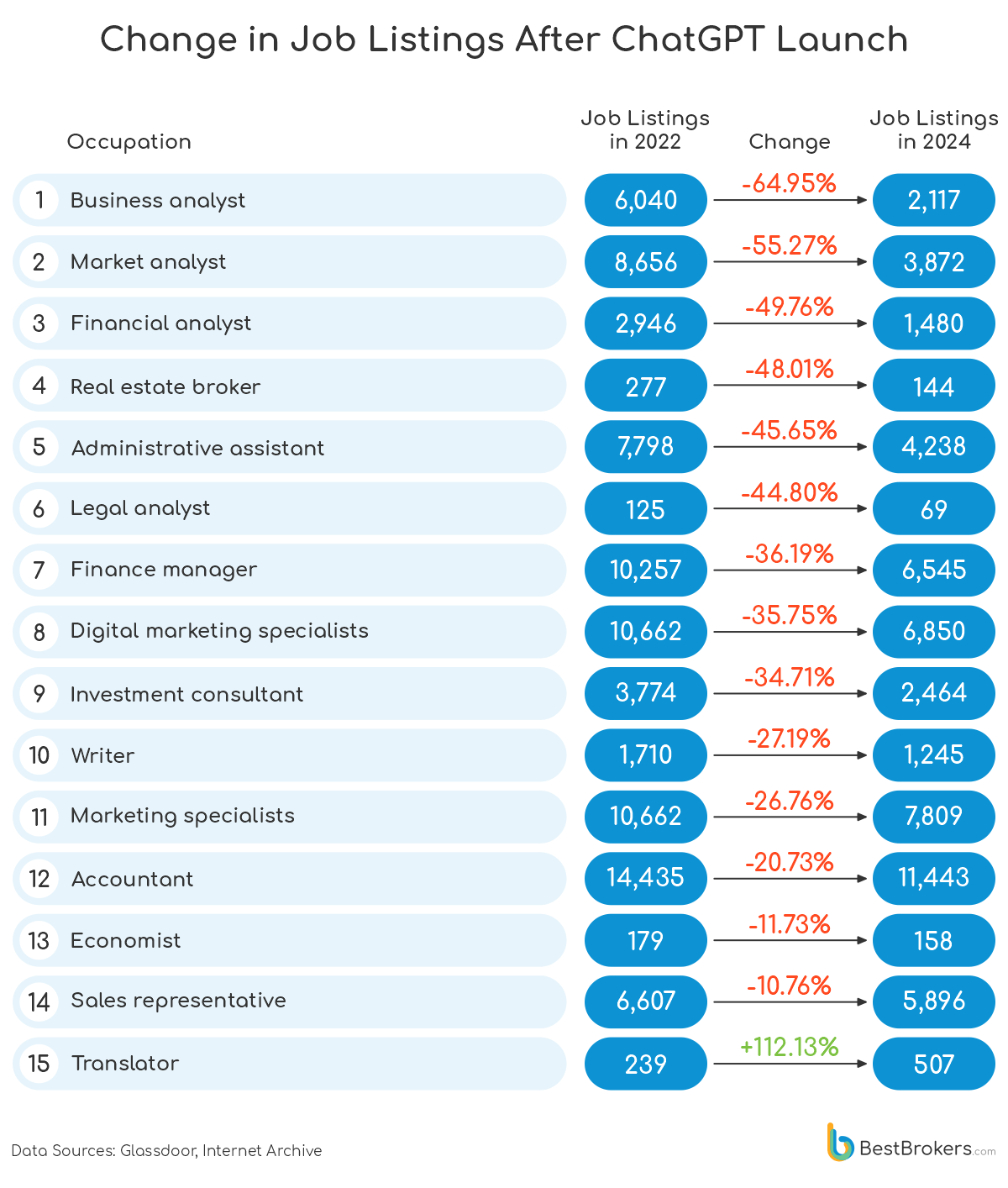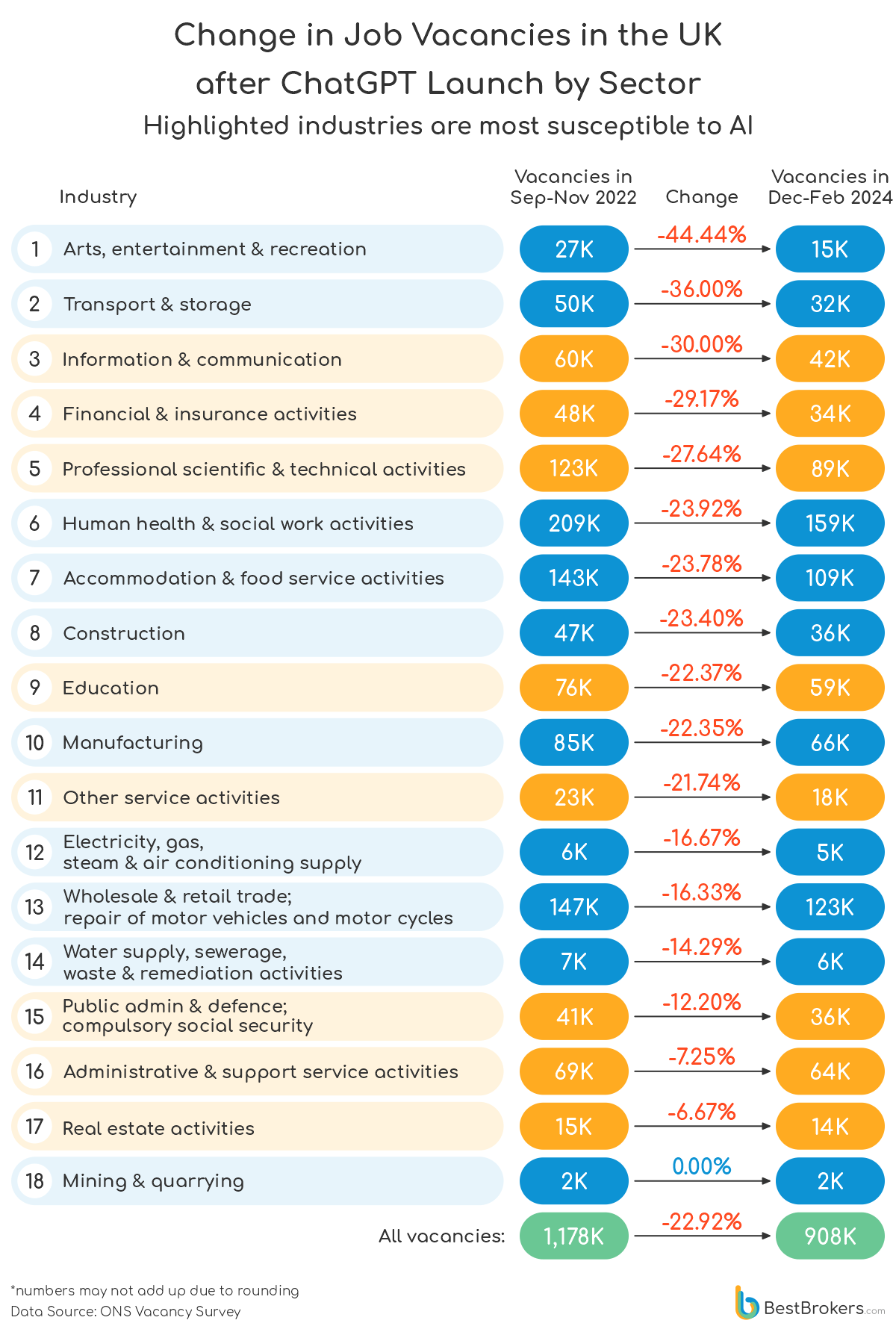For years, automation and mechanisation have been introduced in a wide range of manual jobs, but now, with the era of generative AI, the most susceptible jobs are the ones relying on cognitive skills and more precisely repetitive cognitive skills. When ChatGPT was launched in November 2022, the promising chatbot quickly divided the crowds, becoming a hot topic of many debates on how beneficial it is compared to the possibilities for misuse and exploitation.
Moreover, the UK Department for Education expects thousands of workers, including highly skilled and educated employees, to be replaced by artificial intelligence (AI) in the coming years. Driven by this alarming prospect, the team at BestBrokers decided to check if there has been a noticeable change in the UK’s job listings for certain positions, those particularly susceptible to AI, since the launch of widely available language-based AI models such as OpenAI’s ChatGPT, Gemini (Google’s chatbot and multimodal language model) and Microsoft Copilot.
We compared the number of listings available on Glassdoor, one of the largest employment boards in the UK, with the job offers in the few months before November 2022 using the Internet Archive. We discovered that the three professions in which the number of available positions has decreased the most after ChatGPT’s release are those in the analytical field. Currently leading the ranking with an astounding 64.95% fewer job offers are business analysts.

The professions most threatened by AI and its impact so far
A 2023 survey conducted by Tech.co, discovered that 47% of executives in leading businesses said they were considering delegating tasks to AI systems rather than recruiting new staff.
To find out which jobs may have already been taken over by AI, our team searched through the employment website Glassdoor to see how many job openings there were two years ago compared to now. We focused on fifteen of the most threatened positions, according to the UK Department for Education. In a November 2023 report, the Unit for Future Skills at the Department for Education identifies the jobs most exposed to AI.
The most striking difference we discovered was for business analysts. Just before the release of ChatGPT, there were 6,040 job openings, while in April 2024 they are down to 2,117 or 64.95% less. Even though the idea that AI bots can overtake a job with such a great focus on critical human thinking sounds highly unlikely, it is nevertheless a tool that shouldn’t be underestimated. The reason behind the drastically lower demand now can be linked to the highly advanced AI business analytical tools available to companies online. Because of its ability to sift through vast amounts of information quickly and analyse forecasts, risks, strategies, etc. to come up with solutions, AI is simply more efficient and cost-effective. As a result, business giants like Amazon, Tesla, and Microsoft, among others, are investing heavily in AI and integrating it into more and more operations throughout different departments. According to the Forbes Advisor, 97% of companies believe AI will help their business, while 60% think it will boost productivity.
Quite similarly, another analytical position lands in second place.
The job openings for Market Analysts went from 8,656 in November 2022 down to 3,872 in 2024, or 55.27% fewer offers. GPT-4 can also act as a professional market analyst and predict the best strategy course for a company. Again, although it might not make the profession completely automated, AI is expanding the horizons of businesses and offers tremendous potential for innovation and independent efficiency gains.
Coming in as the third most threatened position is Financial Analyst. With a decline of 49.76% in vacancies, the open job offers are down to just 1,480, from 2,946 in 2022. Jobs in the financial sector are the most exposed to the constantly improving AI systems. With the option to analyse data faster than any human being, AI can read historical patterns and accurately forecast financial market trends. This suggests that with the right employees at hand, businesses can utilise AI systems to boost their financial performance without the help of an outside professional.
The real estate broker is another profession highly exposed to AI impact. A survey conducted in 2023 by the insurance company RSA found, that 8 out of 10 brokers are already using AI daily to enhance their work, which comes as no surprise. There are already 100% automated broker websites, providing 24/7 customer service, authentic advice, and accurate risk assessments without human interference in the communication between the clients and the chat bots. This could be a contributing factor to why broker vacancies have dropped by 48.01% over two years.
Most back-of-house (BOH) jobs like administrative assistants are also highly exposed to a more significant replacement by AI, as job adverts are now down to 4,238 from 7,798 in 2022, or a decline of 45.65%. If the tasks are repetitive and simple, they can easily be done by an AI tool – more efficiently and at a much lower cost.
Legal analysts are a largely research-based profession, which takes time and critical thinking, in a highly complex subject. Several studies in 2023, including two from the AI Center of Excellence and Harvard University, tested GPT-4’s capabilities in various subjects; they also compared it to legal professionals. When given an identical time frame and exam, the AI outperformed the professionals by speed, accuracy, and the number of completed tasks, proving its proficiency and sometimes superiority to human intelligence. Perhaps at some point, it might pose an actual threat to employment, with the profession already experiencing a decline in job listings by 44.80%.
Our search through Glassdoor established that the overall demand for financial managers has also decreased. The drop in vacancies from before November 2022 is 36.19%. AI has considerable potential in this area because of its sophisticated mathematical algorithms and systems. This can partly be the reason why from 10,257 in 2022, there are only 6,545 available openings in 2024.
As jobs closely linked to creativity, knowledge, and the ability to work with words, digital marketing specialists (35.75% fewer vacancies), along with writers (27.19% fewer) and translators (112.13% more job adverts) are professionals, who rely on the human touch in their work, which, at the end of the day, is what separates them from systems like GPT-4. However, even now, AI is advanced enough to produce articles, news, and content in many languages. With the development of AI, there is a chance employers will choose to explore its endless possibilities in creative writing and its capacity to produce intriguing works, for cost-cutting benefits, efficiency, and perhaps innovation.
With investment consulting job vacancies dropping by 34.71% over the past two years, AI can potentially progress greatly in this field if the tendency continues. Even back in 2020, 84% of businesses in research conducted by Cambridge University admitted that AI helped them achieve better results in forecasting, risk assessment, and investing.
Our comparison shows that the number of openings for marketing specialists has dropped by 26.76%. Even though generative AI could be a helpful tool in marketing, making certain processes such as target and sales analysis easier and more affordable, it is still lacking in other areas. ain that field can also be a double-edged sword. When it comes to creativity, AI may not be as efficient as experienced human marketers.
Job listings for accountants and economists have also dropped, by 20.73% and 11.73%, respectively. A recent report by the PwC states that clerical workers and accountants are facing one of the highest threats of automation processes (43% risk of automation by AI), due to the higher productivity of AI in similar tasks and operations. For workers in these positions, it might be of crucial importance in the future to upscale their qualifications or find ways to benefit from AI in their work. It can help them optimise the overall work process and their performance.
The role of a sales representative relies a lot on social skills and human interactions to ensure good results, which perhaps is why there isn’t a major change in the vacancies, from 6,607 to 5,896, or just 10.76%. The job is largely rooted in natural communication and upselling skills, two attributes that are not organic for AI. Nevertheless, remote positions (telemarketers, call centre employees, etc.) are far more vulnerable and AI is already vastly popular in sales as automated chatbots and even telephone operators.
Industries with the biggest drop in job vacancies from 2022
Over the last few years, the UK labour market has been unsteadily adjusting to global events such as Brexit, the COVID-19 pandemic, and foreign political disputes. The recruiting industry claimed that February saw the largest decline in company demand for workers since the early 2021 lockdown. The Recruitment and Employment Confederation (REC) and KMPG reported that February’s monthly demand for staff index dropped from 49.4 the previous month to 46.9, the lowest level since January 2021.

Our research shows that the Information & communication sector, which has been tremendously influenced by AI subjection, saw one of the biggest plunges in jobs since 2022. We looked at official figures for the vacancies from the Office for National Statistics (ONS) and found that available positions dropped from 60 to 42 thousand between September-November 2022 (the last period before the launch of ChatGPT) and the three months ending in February 2024, which is a staggering decrease of 30%. According to the Department of Education, the information & communication sector is the second-most threatened by automation due to its data-driven nature.
The industry holding the highest risk of job layoffs and low recruiting levels, however, is the financial sector due to the introduction of AI for positions in clerical or analytical work. The sector is predisposed to the easy implementation of AI as it enables quicker and more precise data analysis, risk management, forecasting, and real-time calculations. Large amounts of data processing is one of AI’s many capabilities, allowing it to detect patterns and trends that human workers might overlook. According to our comparison, the financial sector in 2024 has about 29.17% fewer available vacancies than it did in 2022, suggesting a declining demand and hiring in the industry.
Although the sector for professional scientific & technical activities is continuously growing, the number of vacancies is significantly less now than it was two years ago, deriving from the overload of specialists in the field and the large number of generative AI systems progressively taking over. One of the most sought-after industries a few years back, it now has 27.64% fewer vacancies since it saw a recruiting peak two years ago and the skill requirement is continuously getting higher and more specialised.
Of course, there are many other contributing factors to the fewer vacancies in 2024, but if one thing is for sure – AI is only getting more advanced each year, and sooner than later, it will play an even bigger role in all industries and perhaps even all jobs.
Methodology
To conduct this analysis, the team at BestBrokers picked the fifteen occupations most exposed to AI from the Department of Education and its “The impact of AI on UK jobs and training” report. We then used the Web Archive to find out the number of available job offers on Glassdoor before the release of ChatGPT (November 2022) and April 2024, in order to compare them and estimate the difference in numbers. For additional resources and data, we used information from the AI Center of Excellence, Harvard University, KMPG, RSA, and the University of Cambridge.